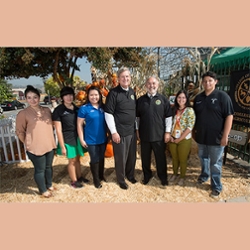U.S. Ag Secretary Visits Cal Poly Pomona

U.S. Agriculture Secretary Tom Vilsack toured the AGRIscapes facility in October, visiting the Farm Store and receiving presentations from students and faculty from the College of Agriculture.
It was the first time an agriculture secretary had visited Cal Poly Pomona, and Vilsack was greeted by President Michael Ortiz, Provost Marten denBoer, College of Agriculture Dean Mary Holz-Clause, the agriculture department chairs, and other university officials.
“The purpose here was to acquaint him with the resources we have, how we’re educating that next generation of agricultural students,” Holz-Clause said. “The USDA has been a funder of some of our research, so we wanted to highlight for him our discoveries. We had heard he was going to be in Southern California, so an invitation was extended.”
The secretary received a tour of the greenhouses at AGRIscapes, observing the orchids and lettuce that are grown there. He also heard presentations from faculty about USDA-funded research into fighting the citrus psyllid, an insect that has decimated citrus groves in the United States, and using drones to help manage water usage.
Vilsack spoke briefly with Associate Professor Eileen Cullen’s entomology class, which meets in the AGRIscapes complex.
Agriculture in the United States is so productive that the country does not need to rely on imports and spends less on food than most other countries, he told the students. The industry also is so efficient that it has allowed many people to leave farming, get an education and explore other careers, Vilsack added. A hundred years ago, many people would have had to stay and work on farms just to make sure their families had enough to eat, he said.
“We have this enormous capacity to do lots of different things in life because we have such great farms. We don’t appreciate that as much as we should,” Vilsack said. “As you learn, make sure you become an ambassador for agriculture and be proud of your connection to agriculture. You’ve got a good life here in America because of agriculture.”
Inside the Farm Store, Vilsack spoke with two students who have participated in Estudiante de Dietetica, a USDA-funded program that helps students advise and educate the Latino community about diet and nutrition.
Stephanie Serpas Jacobo, a graduate student in nutrition who recently became a registered dietician through a Cal Poly Pomona internship program, said she spent time gaining clinical experience advising patients at San Bernardino Community Hospital and skilled nursing facilities in Los Angeles County.
“It’s a great honor to meet someone who has made it possible for someone like me through grant-funded programs to learn and to grow through dietetics,” Jacobo said of meeting Vilsack.